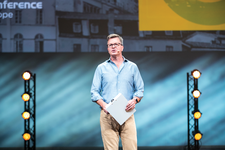Promoting Adoption
Interview – The Linux Foundation's Jim Zemlin

As the Linux Foundation approaches its 20th anniversary, we sit down with Jim Zemlin to talk about how the nonprofit has expanded its mandate since its inception.
In 2000, the Linux Foundation arose from a merger of Open Source Development Labs (OSDL) and the Free Standards Group (FSG) to work towards standardizing Linux and promoting its adoption. Recently, we caught up with Jim Zemlin, the Linux Foundation's long serving executive director, following his keynote at the Open Source Summit Europe 2019 [1] in Lyon, France, to discuss how the nonprofit has matured through the years.
Linux Magazine: What does the Linux Foundation do? Not through its various groups, but what does the foundation itself do?
Jim Zemlin: So there's a few ways to think about the foundation where we are the infrastructure that allows these projects to be a good upstream for a lot of, in particular, commercial downstream usage. And that involves managing the intellectual property. So we have several attorneys on staff who manage the governance, the intellectual property of those projects.
[...]
Buy this article as PDF
(incl. VAT)
Buy Linux Magazine
Subscribe to our Linux Newsletters
Find Linux and Open Source Jobs
Subscribe to our ADMIN Newsletters
Support Our Work
Linux Magazine content is made possible with support from readers like you. Please consider contributing when you’ve found an article to be beneficial.

News
-
Mozilla Plans to AI-ify Firefox
With a new CEO in control, Mozilla is doubling down on a strategy of trust, all the while leaning into AI.
-
Gnome Says No to AI-Generated Extensions
If you're a developer wanting to create a new Gnome extension, you'd best set aside that AI code generator, because the extension team will have none of that.
-
Parrot OS Switches to KDE Plasma Desktop
Yet another distro is making the move to the KDE Plasma desktop.
-
TUXEDO Announces Gemini 17
TUXEDO Computers has released the fourth generation of its Gemini laptop with plenty of updates.
-
Two New Distros Adopt Enlightenment
MX Moksha and AV Linux 25 join ranks with Bodhi Linux and embrace the Enlightenment desktop.
-
Solus Linux 4.8 Removes Python 2
Solus Linux 4.8 has been released with the latest Linux kernel, updated desktops, and a key removal.
-
Zorin OS 18 Hits over a Million Downloads
If you doubt Linux isn't gaining popularity, you only have to look at Zorin OS's download numbers.
-
TUXEDO Computers Scraps Snapdragon X1E-Based Laptop
Due to issues with a Snapdragon CPU, TUXEDO Computers has cancelled its plans to release a laptop based on this elite hardware.
-
Debian Unleashes Debian Libre Live
Debian Libre Live keeps your machine free of proprietary software.
-
Valve Announces Pending Release of Steam Machine
Shout it to the heavens: Steam Machine, powered by Linux, is set to arrive in 2026.

